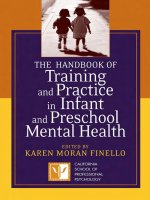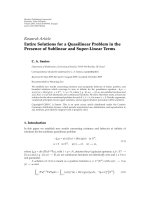The Handbook of Training and Practice in Infant and Preschool Mental Health potx
Bạn đang xem bản rút gọn của tài liệu. Xem và tải ngay bản đầy đủ của tài liệu tại đây (4.52 MB, 529 trang )
01_969710 ffirs.qxd 12/2/04 2:57 PM Page i
Other books published by Jossey-Bass and the California School
of Professional Psychology/Alliant International University:
The California School of Professional Psychology Handbook
of Multicultural Education, Research, Intervention, and
Training, edited by Elizabeth Davis-Russell
The Handbook of Juvenile Forensic Psychology, edited by Neil
G. Ribner
The California School of Organizational Studies Handbook of
Organizational Consulting Psychology: A Comprehensive
Guide to Theory, Skills, and Techniques, edited by Rodney L.
Lowman
The Handbook of Women, Psychology, and the Law, edited by
Andrea Barnes
01_969710 ffirs.qxd 12/2/04 2:57 PM Page ii
The Handbook of
Training and
Practice in Infant
and Preschool
Mental Health
01_969710 ffirs.qxd 12/2/04 2:57 PM Page iii
01_969710 ffirs.qxd 12/2/04 2:57 PM Page iv
Karen Moran Finello, Editor
The Handbook of
Training and
Practice in Infant
and Preschool
Mental Health
Q
01_969710 ffirs.qxd 12/2/04 2:57 PM Page v
Copyright © 2005 by John Wiley & Sons, Inc. All rights reserved.
Published by Jossey-Bass
A Wiley Imprint
989 Market Street, San Francisco, CA 94103-1741 www.josseybass.com
No part of this publication may be reproduced, stored in a retrieval system, or transmitted in any form
or by any means, electronic, mechanical, photocopying, recording, scanning, or otherwise, except as
permitted under Section 107 or 108 of the 1976 United States Copyright Act, without either the prior
written permission of the Publisher, or authorization through payment of the appropriate per-copy
fee to the Copyright Clearance Center, Inc., 222 Rosewood Drive, Danvers, MA 01923, 978-750-8400,
fax 978-646-8600, or on the Web at www.copyright.com. Requests to the Publisher for permission
should be addressed to the Permissions Department, John Wiley & Sons, Inc., 111 River Street,
Hoboken, NJ 07030, 201-748-6011, fax 201-748-6008, e-mail:
Jossey-Bass books and products are available through most bookstores. To contact Jossey-Bass
directly, call our Customer Care Department within the U.S. at 800-956-7739, outside the U.S. at
317-572-3986, or fax 317-572-4002.
Jossey-Bass also publishes its books in a variety of electronic formats. Some content that appears in
print may not be available in electronic books.
Reprint in Chapter One of seventeen basic skills and strategies from J. Shirilla & D. Weatherston
(Eds.), Case studies in infant mental health: Risk, resiliency & relationships (pp. 8–9). Washington,
DC: Zero to Three, the National Center for Infants, Toddlers, and Families, 2000.
Bower excerpt in Chapter Twenty-One reprinted with permission from SCIENCE NEWS, the
weekly newsmagazine of science, copyright 2004 by Science Service.
Library of Congress Cataloging-in-Publication Data
Finello, Karen M.
The handbook of training and practice in infant and preschool mental health / Karen Moran
Finello.
p. cm.
Includes bibliographical references and index.
ISBN 0-7879-6971-0 (alk. paper)
1. Infant psychiatry—Study and teaching. 2. Child psychiatry—Study and teaching. 3. Infants—
Mental health services. 4. Infants—Mental health. 5. Preschool children—Mental health services.
6. Preschool children—Mental health. I. Title.
RJ502.5.F56 2004
618.92'89—dc22 2004011531
Printed in the United States of America
FIRST EDITION
HB Printing 10987654321
01_969710 ffirs.qxd 12/2/04 2:57 PM Page vi
vii
Contents
Preface xi
Part One: General Training and Practice Constructs 1
1 Returning the Treasure to Babies: An Introduction
to Infant Mental Health Service and Training 3
Deborah J. Weatherston, Ph.D.
2 Using Direct Observation in Prevention and
Intervention Services in Infant and Preschool
Mental Health: Training and Practice Issues 31
Martha Farrell Erickson, Ph.D.
3 Training in Assessment of Birth to Five-Year-Olds 51
Karen Moran Finello, Ph.D.
4 Diagnosis of Mental Health in Young Children 71
Marie Kanne Poulsen, Ph.D.
5 Dyadic Therapy with Very Young Children and
Their Primary Caregivers 93
Joan Maltese, Ph.D.
6 Reflective Supervision in Infant, Toddler, and
Preschool Work 114
Mary Claire Heffron, Ph.D.
7 A Seminar to Support the Supporter: Promotion of
Provider Self-Awareness and Sociocultural Perspective 137
Graciela “Chela” Rios Munoz, L.C.S.W.
8 Retraining Clinicians to Work with Birth to
Five-Year-Olds: A Perspective from the Field 162
Mona Maarse Delahooke, Ph.D.
Q
02_969710 ftoc.qxd 12/2/04 2:58 PM Page vii
Part Two: Specialty Areas of Practice 179
9 Developing Reunification and Adoption
Recommendations for Substance-Exposed
Infants and Toddlers in Foster Care 181
Valata Jenkins-Monroe, Ph.D.
10 Play Therapy with Preschoolers Using the
Ecosystemic Model 207
Sue A. Ammen, Ph.D., RPT-S,
and Beth Limberg, Ph.D., RPT-S
11 Intensive Day Treatment for Very Young
Traumatized Children in Residential Care 233
Leena Banerjee, Ph.D., and Lorraine E. Castro, M.A., M.F.T.
12 Kitchen Therapy and Beyond: Mental Health Services
for Young Children in Alternative Settings 256
Brenda Jones Harden, M.S.W., Ph.D.,
and Mawiyah Lythcott, M.S.
13 Delivering Infant and Preschool Mental Health
Services in Rural and Remote Areas 287
Deborah A. Harris, M.S.W., L.I.S.W.
Part Three: Training Standards, Systems, and Technology 305
14 Developing Standards for Training in Infant
and Preschool Mental Health 307
Karen Moran Finello, Ph.D.,
and Marie Kanne Poulsen, Ph.D.
15 An Interdisciplinary Training Model: The Wayne
State University Graduate Certificate Program in
Infant Mental Health 326
Deborah J. Weatherston, Ph.D.
16 The DIR™ Certificate Program: A Case-Based
Competency Training Model 343
Serena Wieder, Ph.D.
17 Using Technology as a Training, Supervision,
and Consultation Aid 357
Valerie A. Wajda-Johnston, Ph.D., Anna T. Smyke, Ph.D.,
Geoffrey Nagle, Ph.D., M.P.H., L.C.S.W.,
and Julie A. Larrieu, Ph.D.
viii CONTENTS
02_969710 ftoc.qxd 12/2/04 2:58 PM Page viii
Part Four: Innovative Models of Training
and Service Delivery 375
18 Developmental Pathways to Mental Health:
The DIR™ Model for Comprehensive
Approaches to Assessment and Intervention 377
Serena Wieder, Ph.D., and Stanley I. Greenspan, M.D.
19 The Relationships for Growth Project: A
Transformational Collaboration Between
Head Start, Mental Health, and University Systems 402
Rebecca Shahmoon-Shanok, M.S.W., Ph.D.,
Faith Lamb-Parker, Ph.D., Ellen Halpern, Ph.D.,
Megan Grant, Ph.D., Carole Lapidus, M.S., M.S.W.,
and Charles Seagle, Ph.D.
Part Five: Transforming Practice Across Systems of Care 425
20 The Role of Reflective Process in Infusing
Relationship-Based Practice into an Early
Intervention System 427
Linda Gilkerson, Ph.D., and Tina Taylor Ritzler, M.A.
21 Apprenticeship, Transformational Enterprise,
and the Ripple Effect: Transferring Knowledge
to Improve Programs Serving Young Children
and Their Families 453
Rebecca Shahmoon-Shanok, M.S.W., Ph.D.,
Carole Lapidus, M.S., M.S.W., Megan Grant, Ph.D.,
Ellen Halpern, Ph.D., and Faith Lamb-Parker, Ph.D.
About the Editor 487
About the Contributors 489
Name Index 495
Subject Index 503
Contents ix
02_969710 ftoc.qxd 12/2/04 2:58 PM Page ix
To my daughter, Courtney, who has added
immeasurable richness to my life.
03_969710 fbetw.qxd 12/2/04 2:58 PM Page x
xi
Preface
The delivery of mental health services to infants, toddlers, preschool-
ers, and their families involves a complex interweaving of skills that
straddle disciplines and test boundaries. Provision of such services is
a testament to the strength of practitioners who struggle to balance the
necessary knowledge base, application strategies, and self-awareness
required by the work. It is a fragile dance, with the practitioner often
initiating a conversation that a caregiver does not want to have, testing
and retesting boundaries as the work unfolds, and maintaining a steady,
yet ever adapting, view of individual children and families. The prac-
titioner must provide constancy in an ever changing world while
remaining open to new possibilities in her own work and in the lives
of the families served. The dance requires the clinician to adjust her
tempo across time—sometimes it is a slow dreamy waltz, at other times
a spinning, whirling motion accompanying the child and family on
their precious journey of developing and becoming.
In order to be effective, the infant and preschool mental health
practitioner must exhibit a wide range of personality characteristics—
some deep within, others at the surface—all ready to be called up at
the appropriate moment. These characteristics include a sense of
humor that allows the clinician to share joy with a family and to
lighten dark moments. She must be able to laugh with a family, to
laugh with her colleagues, and to laugh at herself. She must be patient,
not only with herself and her expectations of her own work but in her
expectations of families. She must be able to sit quietly and listen but
not be afraid of providing advice when asked. A practitioner must also
be enthusiastic and passionate about her work—the dance is differ-
ent, then, than when a family encounters indifference and apathy.
Compassion must come as second nature but not overwhelm the
work. Showing understanding, interest, and concern is crucial, but so
is the ability to step back from the work and to maintain direction
without being sidelined by overwhelming need. A practitioner must
Q
04_969710 fpref.qxd 12/2/04 2:58 PM Page xi
have boundaries but be able to work in boundary-less fashion—
cutting across disciplines, making decisions that are appropriate in her
work with one family but not with another family. High-quality super-
vision is essential to this work. The good supervisor holds the clini-
cian so that continuing progress is possible and acts as the depository
for the self-doubt that inevitably arises when doing this complex work.
Infant and preschool mental health is an ever changing, evolving
field. This handbook is designed to help the clinician in the journey
of professional growth as she works to help young children and fam-
ilies realize their potentials. The handbook is intended to help train-
ing programs, agencies, and clinicians determine what skills and
clinical experiences are needed to do the wide range of work that
makes up this field and decide how to develop those skills and struc-
ture the clinical experiences.
The book is divided into five parts. Part One focuses on broad
training areas in which a clinician interested in infant and preschool
mental health practice must develop skills. Weatherston’s chapter pro-
vides a wonderful overview of current and historical issues related to
training and service delivery, along with key concepts in infant men-
tal health. Other chapters in Part One focus on developing observa-
tion skills, designing assessment training, developing diagnostic skills
with very young children, providing dyadic therapy, providing (and
receiving) reflective supervision, and developing self-awareness and
sociocultural perspective. Finally, the chapter by Delahooke examines
retraining from the perspective of the practitioner who struggles with
putting together key training elements, without the benefit of a com-
prehensive training program. This chapter is particularly pertinent, as
many practicing clinicians who decide to retrain to work with birth
to five-year-olds are not able to move to another city and enroll in a
comprehensive training program.
Part Two addresses specialized areas of practice, including the eval-
uation and decision-making process for reunification and adoption,
play therapy with preschoolers, and intensive day treatment for very
young, traumatized children in residential care. The last two chapters
in Part Two focus on the delivery of infant and preschool mental
health services outside the traditional mental health arena. Jones
Harden and Lythcott look at issues in providing services in homes,
schools, day-care centers, and social service agencies. Harris addresses
strategies for delivering services in rural and remote areas.
xii PREFACE
04_969710 fpref.qxd 12/2/04 2:58 PM Page xii
Part Three explores training systems and the use of technology for
training, supervision, and consultation. Included are chapters exam-
ining the development of training and practice standards within Cal-
ifornia, the Wayne State University Graduate Certificate Program in
Michigan, and the development of the DIR
TM
Certificate program.
Wajda-Johnston and her colleagues have put together a wonderful
examination of the struggles they have encountered and the success
they have had in developing technology for remote supervision and
training.
Part Four includes several innovative models of service delivery and
training that rely on collaboration between disciplines and an inte-
grative approach to services to create system change. Finally, Part Five
is a thought-provoking examination of programs in Illinois and New
York that transform training and practice through the infusion of
reflective process and the creation of “ripples” across systems.
As infant and preschool mental health practitioners continue to
develop and expand the scope of their practices, they will find many
of the chapters in this handbook particularly important to their pro-
fessional development. The authors are trainers and service providers
who are involved with the leading edge of infant and preschool men-
tal health services across the United States. I hope that this book will
be useful as a training guide for developing clinicians, a resource for
current practitioners, and an inspiration to programs looking to
expand their boundaries on behalf of very young children and their
families.
ACKNOWLEDGMENTS
I would like to thank Dr. Natalie Porter of Alliant International
University, who encouraged me to move this handbook from concept
to product. I am extremely grateful for her support and her help in
connecting me to Jossey-Bass. My extraordinary home visiting pro-
gram staff, whose dedication to young children and families is an
ongoing inspiration, also deserve special thanks for their support while
this handbook was developed and completed.
The excitement and passion for the field, passed along by vision-
ary leaders who worked tirelessly on behalf of very young children and
families long before anyone knew what infant mental health meant,
continue to motivate all of us and drive our clinical work. The inspired
Preface xiii
04_969710 fpref.qxd 12/2/04 2:58 PM Page xiii
teaching of these visionary leaders has led us to be better clinicians,
researchers, and teachers and to extend the passion for the field to
others whom we train. National and international organizations ded-
icated to infants and young children, including Zero to Three, the
International Society on Infant Studies, and the World Association for
Infant Mental Health, provide continuing opportunities to share our
knowledge, our work, and our dreams for improved practice, research,
and training. We have all been professionally and personally enriched
by our associations with these organizations and the individuals who
constitute them.
Finally, this handbook would not have been possible without the
considerable time and energy of the authors of each chapter. Despite
heavy schedules full of service delivery, teaching, and research, these
amazing authors put together stellar chapters that are thought pro-
voking, educational, and inspiring. I cannot thank them enough for
their collegiality and commitment. They are not only brilliant thinkers
but are, even more important, sincere and caring individuals. The field
will be forever enriched by their work.
Los Angeles, California K
AREN
F
INELLO
xiv PREFACE
04_969710 fpref.qxd 12/2/04 2:58 PM Page xiv
The Handbook of
Training and
Practice in Infant
and Preschool
Mental Health
05_969710 flast.qxd 12/2/04 2:59 PM Page xv
05_969710 flast.qxd 12/2/04 2:59 PM Page xvi
PART ONE
General Training and
Practice Constructs
06_969710 pt01.qxd 12/2/04 2:59 PM Page 1
06_969710 pt01.qxd 12/2/04 2:59 PM Page 2
3
Q
CHAPTER ONE
Returning the Treasure
to Babies
An Introduction to Infant Mental
Health Service and Training
Deborah J. Weatherston, Ph.D.
Imagine that you are an infant mental health practitioner and that
you are sitting in a family’s kitchen. The young mother, her infant, and her toddler
were referred to you by a nurse practitioner who had some concerns about the baby’s
care and development following the baby’s discharge from the newborn intensive care
unit. It is about 2
P
.
M
. Dishes are piled high in the sink; food from several meals sits
on the counter. It is hot. The windows are shut tight, and although the sun is shining,
the shades are drawn as if to protect against the intrusion of daylight. The baby, three
months old, cries in the back room. The information that you were given tells you that
the baby was premature and had been separated from her mother’s care for three weeks
before hospital discharge. The twenty-two-month-old toddler, a boy, brings you toys
and indicates with a grunt that he wants to climb up on your lap—you, the stranger.
His face is smudged with traces of chocolate. He is pale and unsmiling. There are sig-
nificant developmental questions about both small children. Their mother, a single
parent, twenty-four years old, is alone in caring for her children and isolated from fam-
ily or friends. She seems agitated and surprised that you have come, although you
spoke to her yesterday on the phone. She, too, is unsmiling, unable to pay attention
to the toddler or to hear the baby’s continuing cries. She lights a cigarette,pours a cup
of coffee for herself and asks you, “So . . . why are you here?”
07_969710 ch01.qxd 12/2/04 2:59 PM Page 3
This vignette marks the beginning of an infant mental health inter-
vention in which the focus is on early development and relationships
between a parent and her two young children. The scene is a familiar
one in the world of infant mental health, challenging and complex.
What is it that you, in the role of an infant mental health practitioner,
will do? What core beliefs, skills, and strategies will guide you to work
effectively from an infant mental health perspective? Finally, what
training experiences will you need to have in order to offer this family
meaningful service support? The intent of this chapter is to introduce
the reader to the practice of infant mental health and the experiences
that contribute to the growth and awakening of an infant mental
health therapist.
WHAT IS INFANT MENTAL HEALTH?
Selma Fraiberg and her colleagues in Michigan coined the phrase
infant mental health in the late 1960s. It is defined as the social, emo-
tional, and cognitive well-being of a baby who is under three years of
age, within the context of a caregiving relationship (Fraiberg, 1980).
Fraiberg understood that early deprivation affected both development
and behavior in infancy and reminded us that an infant’s capacity for
love and for learning begins in those early years. She had been trained
in a psychodynamic approach to mental health treatment for adults
and children, which she adapted for work with parents and young
children from birth to three.
Fraiberg was attuned to the power and importance of relationships
and understood that how a parent cares for a very young child has a
significant impact on the emotional health of that child. She also
understood that parental history and past relationship experiences
influence the development of relationships between parents and young
children. Fraiberg referred to this new knowledge and understanding
about infants and parents as “a treasure that should be returned
to babies and their families as a gift from science” (1980, p. 3). She
spent the remainder of her career returning that gift through training
and a carefully crafted approach called infant mental health service
(Weatherston, 2000).
Four questions are of great significance to the scope of infant men-
tal health practice and to the training needs of infant mental health
specialists: What about the baby? What about the parents who care
for the baby? What about their early developing relationship and the
4 INFANT AND PRESCHOOL MENTAL HEALTH
07_969710 ch01.qxd 12/2/04 2:59 PM Page 4
context for early care? What about the practitioner? These questions
shape the framework for infant mental health practice and training
(Weatherston, 2001).
INFANT MENTAL HEALTH PRACTICE
Regarded as a unique approach to the understanding and treatment of
infants, toddlers, and families, infant mental health practice embraces
the belief that all babies and young children can benefit from a
sustained, primary relationship that is nurturing, supportive, and pro-
tective (Stinson, Tableman, & Weatherston, 2000; Shirilla & Weather-
ston, 2002). The developing parent-child relationship should be placed
at the center of the therapist’s work from the moment a family is
referred or asks for help through the period of observation, assessment,
and intervention (Lieberman & Pawl, 1993; Lieberman & Zeanah,
1999).
Parents and infants are seen together, often in the intimacy of their
own homes, where the infant mental health therapist offers his or her
relationship as a therapeutic context for shared observations, careful
listening, and empathic response. It is most customary for an infant
mental health therapist to work with a family weekly or even more
frequently, for a maximum of one-and-a-half hours per visit. Some
interventions may be short term or for a crisis response; others may
be for assessment purposes. Most continue for three months to one
year, and some sustain the work for longer periods of time, depend-
ing on the infant’s or family’s need. The goals are to support the social
and emotional development of an infant or toddler, to identify and
reduce the risk of disorder or delay, to nurture the emerging caregiv-
ing competencies that each parent has, and to strengthen early devel-
oping relationships in families.
The stakes are high. Babies and families in crisis cannot wait. Effec-
tive infant mental health practitioners observe infants and parents
together and wonder about the nature of their interactions and devel-
oping relationships (Trout, 1982; McDonough, 1993; Cohen, Muir, &
Lojkasek, 1999). Practitioners listen carefully, ask questions that are
thoughtful, and gather information about the baby and early care.
They may use formal developmental guides or diagnostic criteria, as
appropriate. Practitioners invite parental participation throughout
the assessment and treatment process, make an effort to establish
warm and trusting relationships with parents, and consider parents’
Returning the Treasure to Babies 5
07_969710 ch01.qxd 12/2/04 2:59 PM Page 5
feelings in response to observations and interviews (Hirshberg, 1993).
Knowledgeable and skillful infant mental health practitioners organize
their understanding in a meaningful and practical way. They listen
carefully to parents and are not judgmental. They communicate clearly
and invite a supportive partnership with parents (Hirshberg, 1996).
Core Infant Mental Health Beliefs
Core beliefs guide infant mental health practitioners to cherish each
encounter with infants or toddlers and their families and to think
deeply about early developing relationships (Trout, 1987; Stinson,
Tableman, & Weatherston, 2000; Weatherston, 2000). These beliefs are
the bedrock of infant mental health practice. They shape a practi-
tioner’s approach to all infants or toddlers and families who are
referred for early services. Some of the most fundamental beliefs
are the following:
• Optimal growth and development occur within nurturing
relationships.
• The birth and care of a baby offer a family the possibility of new
relationships, growth, and change.
• What happens in the early years affects the course of develop-
ment across the life span.
• Early developing attachment relationships may be distorted by
parental histories of unresolved losses or traumatic life events.
• The therapeutic presence of an infant mental health practitioner
may reduce the risk of early relationship failure and offer hope-
fulness for change.
Key Components of Infant Mental Health Practice
Infant mental health services include a variety of components: con-
crete resource assistance, emotional support, developmental guidance,
advocacy, and infant-parent psychotherapy. Some or all of these com-
ponents will be appropriate when working with individual infants and
families (Fraiberg, 1980; Weatherston, 1997; Weatherston & Tableman,
2002). All provide opportunities to nurture early development and
relationships when responding to families.
6 INFANT AND PRESCHOOL MENTAL HEALTH
07_969710 ch01.qxd 12/2/04 2:59 PM Page 6
• Concrete resource assistance refers to the meeting of basic needs
for food, clothing, medical care, shelter, and protection. The practi-
tioner who feeds or clothes or takes a family to the clinic assures par-
ents and young children that he cares about them and will work to
ease their burdens of care.
• Emotional support is defined as compassion offered to a parent
who faces a crisis during pregnancy or in caring for a new baby or tod-
dler. Alone, or without emotional reinforcement, a parent needs some-
one who is emotionally available, listens carefully, ask questions
sensitively, and holds the many feelings that threaten to overwhelm or
confuse.
• Developmental guidance is the shared understanding about the
baby’s development and specific needs for care. The practitioner and
parent carefully identify emerging capacities and concerns, reaching
an understanding of the uniqueness of each baby through careful
observation and words.
• Advocacy is the offer of help to parent or infant when they can-
not successfully ask for it themselves (for example, a safe place to live,
assistance in finding child care, support for a special needs assess-
ment). To speak effectively on behalf of an infant’s need for early care
or a parent’s need for support is often a daunting, but critical, task.
• Infant-parent psychotherapy offers a parent the opportunity to
explore thoughts and feelings awakened in the presence of an infant
or toddler. In the intimacy of the home visit, a parent may share
stories of past experiences and significant relationships, major fears,
disappointments, and unresolved losses as they affect the care of a
baby and the early developing relationship between parent and child.
Crucial to the effectiveness of these service components is the work-
ing relationship that develops between each infant mental health prac-
titioner and parent (Fraiberg, 1980; Lieberman & Pawl, 1993;
Hirshberg, 1996). Respectful and consistent, the infant mental health
practitioner must remain attentive to each parent’s strengths and needs.
Within the safety of the relationship with the infant mental health
practitioner, parents feel well cared for and secure, held by the thera-
pist’s words and in her mind (Pawl, 1994). The practitioner listens care-
fully, follows the parent’s lead, remains attuned, sets limits, and
responds with empathy. Well held, the parent experiences possibilities
for growth and change through the relationship with her infant.
Returning the Treasure to Babies 7
07_969710 ch01.qxd 12/2/04 2:59 PM Page 7
Infant Mental Health Skills and Strategies
Clinicians identify basic skills and strategies that are ingredients for
compassionate and effective work with infants and families (Fraiberg,
Adelson, & Shapiro, 1975; Blos & Davies, 1993; Pawl, 1994; Proulx,
2002; Barron, 2002; Daligga, 2002; Oleksiak, 2002; Weatherston, 2002).
These contribute to the infant mental health practitioner’s under-
standing of the infant or toddler, the awakening or repair of the early
developing parent-child relationship, and the parent’s capacity to
nurture and protect her young child. They help infant mental health
practitioners engage and sustain relationships with parents, as they
think deeply about the social and emotional health and needs of each
parent and very young child (Weatherston, 2000):
Identify and respond to immediate concrete service needs, to the
extent necessary and possible.
Meet with the infant and parent together throughout the period
of observation, assessment, and intervention, nurturing rela-
tionships and using them as instruments of change.
Invite parents to talk and listen carefully to what each parent has
to tell you.
Sit beside the parent to observe the infant or toddler’s growth
and development.
Offer anticipatory guidance to the parent that is specific to the
infant or young child, remaining sensitive to the parent’s readi-
ness to listen.
Alert each parent to the infant’s or toddler’s accomplishments
and needs.
Create opportunities for pleasurable interaction between parent
and infant.
Allow the parents to set the agenda and take the lead.
Identify and enhance the capacities that each parent brings to
the care of the infant or toddler.
Speak for the infant and parent on behalf of their developmental
and relationship needs.
Wonder about the parent’s thoughts and feelings related to the
presence and care of the infant and the changing responsibilities
of parenthood.
Listen for the past as it is expressed in the present.
8 INFANT AND PRESCHOOL MENTAL HEALTH
07_969710 ch01.qxd 12/2/04 2:59 PM Page 8









